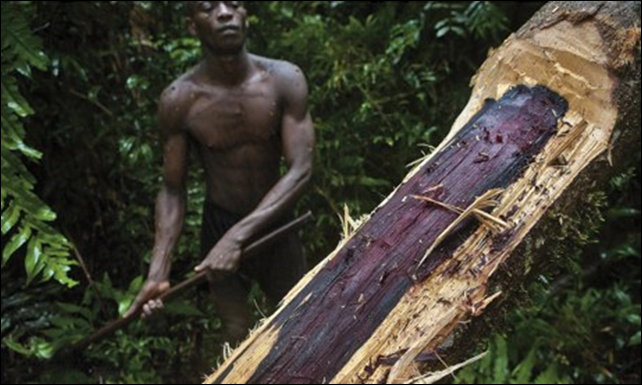Madagascar forests vanish to feed taste for rosewood in West and China – ‘We don’t have yet a legal government, so everyone is taking advantage of the situation and they are doing what they want’
By Tamasin Ford, with additional reporting by Iloniaina Alain Rakotondravony
23 December 2013 CAP EST, Madagascar (The Guardian) – Blood-red sawdust coats every surface in the small carpentry workshop, where Primo Jean Besy is at the lathe fashioning vases out of ruby-coloured logs. Besy and his father are small-scale carpenters in Antalaha in north-east Madagascar, and are taking advantage of a recent resurgence in demand for wood from the bois de rose tree, prized for the extraordinary coloured streaks that weave through its centre. “It’s easy to sell because the wood is so famous,” said Besy, whose skin glistens with red powder. “People from [the capital] Antananarivo come here [to buy goods]. They like it because they can sell it to foreigners.” The father and son pair are just the tip of the booming trade in bois de rose, one of the world’s rarest trees, even though the logging and export of rosewood from Madagascar is banned. The wood is being smuggled out of Madagascar at an alarming rate, said Randrianasolo Eliahevitra, regional director of the church-based development organisation SAF/FJKM. “People are afraid to talk [about who is behind the smuggling],” said Eliahevitra, adding that he feared for his life if he named any of those responsible. He said continuing political instability in Madagascar, a country reeling in poverty after four years of military rule and crippling economic sanctions, allowed the multimillion-dollar industry to flourish. “At this time we don’t have yet a legal government, so everyone is taking advantage of the situation and they are doing what they want,” Eliahevitra said. [more]
Madagascar’s forests vanish to feed taste for rosewood in west and China
